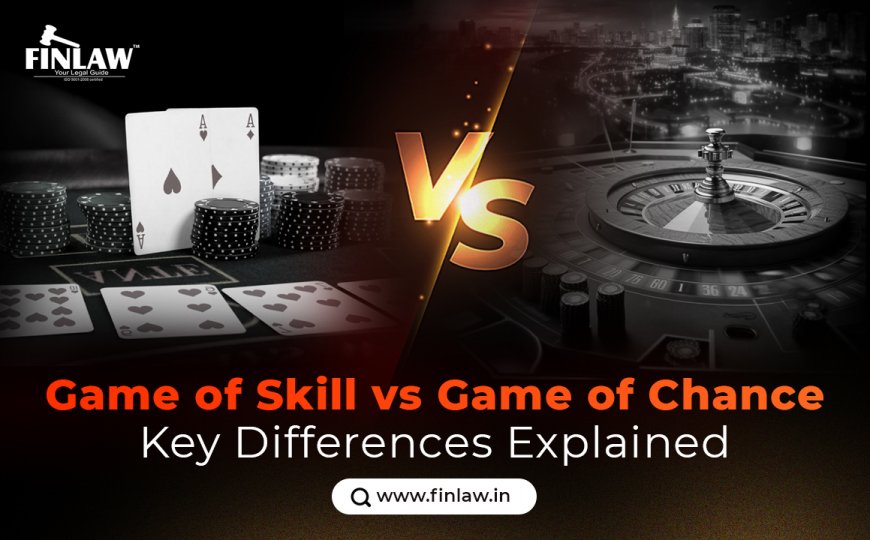Game of Skill vs Game of Chance: Key Differences Explained
Learn the legal, regulatory, and gameplay differences between a game of skill vs game of chance in India. Includes examples, laws & tax rules.

In India’s rapidly evolving gaming landscape, understanding the distinction between a game of skill and a game of chance is crucial. This differentiation not only influences the legality of games but also affects taxation, regulation, and player rights. With the rise of online gaming platforms, esports, and fantasy sports, the debate surrounding these classifications has intensified.
This comprehensive guide delves into the definitions, legal frameworks, and real-world examples to clarify the key differences between games of skill and games of chance in India. It also explores regulatory implications, industry trends, and what this means for both developers and users.
What Is a Game of Skill?
A game of skill is one where the outcome is predominantly determined by the player's mental or physical prowess, strategy, and decision-making abilities. While elements of chance may exist, they are overshadowed by the player's skill. Indian courts have consistently upheld that games requiring substantial skill are not classified as gambling.
Key Characteristics:
-
Strategic Decision-Making: Players must make informed choices to influence the game's outcome.
-
Practice and Experience: Improvement over time through learning and honing skills.
-
Predictability: Outcomes can often be anticipated based on the player's actions.
-
Skill-Dominant Gameplay: Requires tactical planning, logical reasoning, and memory.
Examples in India:
-
Chess: A classic example requiring deep strategy and foresight.
-
Rummy: Recognized by the Supreme Court as a game of skill due to the need for memory and strategy.
-
Fantasy Sports (e.g., Dream11): Involves selecting players based on knowledge and analysis, deemed a game of skill by multiple High Courts.
-
Esports: Competitive video gaming requiring quick reflexes, coordination, and strategic planning.
-
Bridge: Recognized internationally and in India as a mind sport with skill-based gameplay.
-
Online Trivia and Quiz Games: These rely on a player's knowledge, speed, and accuracy.
-
Skill-based Card Games: Variants like Call Break and certain versions of Poker where strategic betting is critical.
What Is a Game of Chance?
A game of chance relies primarily on randomness, luck, or unpredictable factors. Players have minimal control over the outcome, making these games largely dependent on chance rather than skill. In India, games of chance are generally categorized under gambling and are subject to strict regulations or outright bans in many states.
Key Characteristics:
-
Random Outcomes: Results are unpredictable and not influenced by the player's decisions.
-
Minimal Skill Involvement: Success does not significantly depend on the player's abilities.
-
High Risk: Often associated with monetary stakes and potential for addiction.
-
No Control Over Results: The player's expertise or strategy has little to no impact.
Examples in India:
-
Lotteries: Winners are chosen randomly, with no skill involved.
-
Slot Machines: Outcomes are determined by random number generators.
-
Roulette: A casino game where the result is based on where the ball lands.
-
Teen Patti (Flush): A card game heavily reliant on luck, classified as gambling by courts.
-
Dice-Based Games: Including online versions of Ludo, if primarily driven by random rolls.
-
Online Bingo: Depends on numbers being drawn at random.
-
Scratch Cards: Outcomes are entirely unpredictable and based on luck.
Legal Framework in India
The legal distinction between games of skill and games of chance is pivotal in determining their permissibility under Indian law.
Central Legislation:
-
Public Gambling Act, 1867: Prohibits running or being in charge of a public gambling house. However, it excludes games of skill from its purview.
Judicial Interpretations:
-
State of Andhra Pradesh v. K. Satyanarayana (1968): The Supreme Court ruled that Rummy is a game of skill, emphasizing the importance of memory and strategy.
-
State of Bombay v. R.M.D. Chamarbaugwala: The court held that competitions involving substantial skill are not gambling activities.
-
Varun Gumber v. Union Territory of Chandigarh (2017): Fantasy sports were classified as games of skill by the Punjab and Haryana High Court.
-
Dr. K.R. Lakshmanan v. State of Tamil Nadu (1996): Recognized horse racing as a game of skill, establishing further precedent.
State-Specific Regulations:
Since gambling is a state subject, individual states have the authority to legislate on the matter:
-
Permissive States: Maharashtra, Karnataka, Rajasthan, Punjab, Haryana, West Bengal, Uttar Pradesh.
-
Restrictive States: Telangana, Andhra Pradesh, Odisha, Assam have imposed bans or restrictions on certain online games, including fantasy sports.
-
Conditional States: Nagaland and Sikkim allow games of skill under specific licensing conditions through their online gaming regulations.
Distinguishing Factors: Game of Skill vs Game of Chance
|
Aspect |
Game of Skill |
Game of Chance |
|
Outcome Determined By |
Player's skill, strategy, and decisions |
Randomness and luck |
|
Legal Status |
Generally legal across India |
Often restricted or banned |
|
Examples |
Chess, Rummy, Fantasy Sports |
Lotteries, Slot Machines, Teen Patti |
|
Regulation |
Subject to fewer restrictions |
Heavily regulated under gambling laws |
|
Player Control |
High |
Low |
|
Skill Development |
Yes – improves over time |
No – outcomes are unrelated to experience |
|
Addiction Potential |
Lower |
Higher |
|
Taxation |
May be taxed at standard or lower rates |
Subject to higher GST (28%) |
The Grey Area: Games with Elements of Both
Some games incorporate both skill and chance, making their classification complex:
-
Poker: While it involves strategic betting and reading opponents, the initial card distribution is random. Courts have varied in their classification.
-
Ludo (e.g., Zupee): Combines dice rolls (chance) with strategic movement of tokens (skill). Legal status varies by state.
-
Fantasy Gaming Formats: While mainstream daily fantasy sports have been ruled skill-based, certain formats that emphasize luck may fall into a regulatory grey zone.
-
Mobile Puzzle Games with RNG Elements: Games that involve both skill-based matching and random power-ups or elements.
Implications for Players and Operators
For Players:
-
Legal Awareness: Understanding the classification of a game can help avoid legal pitfalls.
-
Responsible Gaming: Engaging in games of skill can offer entertainment without the high risks associated with gambling.
-
Consumer Rights: In skill-based games, users may have stronger legal protections under consumer laws.
-
Tax Liabilities: Winnings from games of skill may be treated differently for taxation purposes than gambling winnings.
For Operators:
-
Compliance: Ensuring that games are classified correctly and comply with state-specific regulations is crucial.
-
Licensing: Obtaining necessary licenses in states where required, especially for games that fall into the grey area.
-
Content Design: Game developers must ensure that elements of skill outweigh chance to avoid being classified under gambling.
-
Tax Considerations: Games of chance often attract higher tax rates (like GST at 28%) compared to skill-based games.
-
User Trust: Clearly communicating the nature of the game (skill vs. chance) builds credibility and user loyalty.
Why It Matters: The Future of Indian Gaming
As the Indian gaming industry surges—driven by mobile penetration, cheap data, and increasing digital participation—the distinction between game of skill vs game of chance becomes more relevant than ever. Startups, investors, and regulators must work together to encourage responsible gaming while protecting users from exploitative gambling practices.
The central government’s push toward a unified online gaming policy and the increasing interest from global investors make legal clarity critical. The recently established self-regulatory bodies and proposed guidelines under the IT Act are expected to formalize this distinction further.
India is also witnessing the rise of educational gaming, gamified learning apps, and blockchain-based games, where clarity on skill vs chance can influence funding, user base, and compliance.
Conclusion
The distinction between games of skill and games of chance in India is not merely academic—it has real-world implications for legality, taxation, innovation, and user safety. As online and mobile gaming platforms continue to grow, this classification will shape the industry’s future.
For players, developers, and regulators, understanding and respecting this line is essential. By staying informed, promoting skill-based gameplay, and adhering to evolving legal standards, all stakeholders can contribute to a more transparent and thriving gaming ecosystem in India.
What's Your Reaction?



















